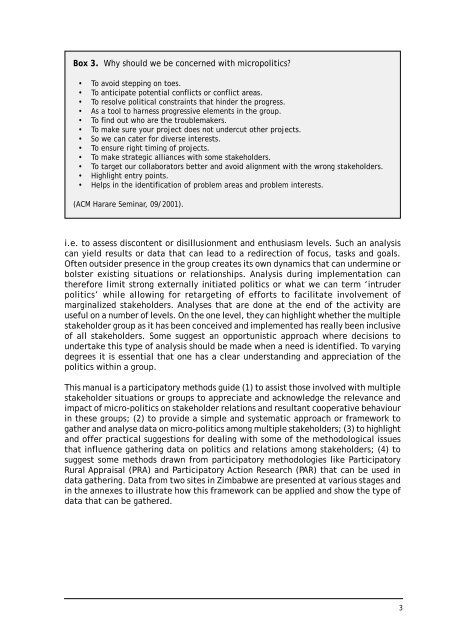Where the power lies: multiple stakeholder politics over natural ...
Where the power lies: multiple stakeholder politics over natural ...
Where the power lies: multiple stakeholder politics over natural ...
Create successful ePaper yourself
Turn your PDF publications into a flip-book with our unique Google optimized e-Paper software.
Box 3. Why should we be concerned with micro<strong>politics</strong>?<br />
To avoid stepping on toes.<br />
To anticipate potential conflicts or conflict areas.<br />
To resolve political constraints that hinder <strong>the</strong> progress.<br />
As a tool to harness progressive elements in <strong>the</strong> group.<br />
To find out who are <strong>the</strong> troublemakers.<br />
To make sure your project does not undercut o<strong>the</strong>r projects.<br />
So we can cater for diverse interests.<br />
To ensure right timing of projects.<br />
To make strategic alliances with some <strong>stakeholder</strong>s.<br />
To target our collaborators better and avoid alignment with <strong>the</strong> wrong <strong>stakeholder</strong>s.<br />
Highlight entry points.<br />
Helps in <strong>the</strong> identification of problem areas and problem interests.<br />
(ACM Harare Seminar, 09/2001).<br />
i.e. to assess discontent or disillusionment and enthusiasm levels. Such an analysis<br />
can yield results or data that can lead to a redirection of focus, tasks and goals.<br />
Often outsider presence in <strong>the</strong> group creates its own dynamics that can undermine or<br />
bolster existing situations or relationships. Analysis during implementation can<br />
<strong>the</strong>refore limit strong externally initiated <strong>politics</strong> or what we can term ‘intruder<br />
<strong>politics</strong>’ while allowing for retargeting of efforts to facilitate involvement of<br />
marginalized <strong>stakeholder</strong>s. Analyses that are done at <strong>the</strong> end of <strong>the</strong> activity are<br />
useful on a number of levels. On <strong>the</strong> one level, <strong>the</strong>y can highlight whe<strong>the</strong>r <strong>the</strong> <strong>multiple</strong><br />
<strong>stakeholder</strong> group as it has been conceived and implemented has really been inclusive<br />
of all <strong>stakeholder</strong>s. Some suggest an opportunistic approach where decisions to<br />
undertake this type of analysis should be made when a need is identified. To varying<br />
degrees it is essential that one has a clear understanding and appreciation of <strong>the</strong><br />
<strong>politics</strong> within a group.<br />
This manual is a participatory methods guide (1) to assist those involved with <strong>multiple</strong><br />
<strong>stakeholder</strong> situations or groups to appreciate and acknowledge <strong>the</strong> relevance and<br />
impact of micro-<strong>politics</strong> on <strong>stakeholder</strong> relations and resultant cooperative behaviour<br />
in <strong>the</strong>se groups; (2) to provide a simple and systematic approach or framework to<br />
ga<strong>the</strong>r and analyse data on micro-<strong>politics</strong> among <strong>multiple</strong> <strong>stakeholder</strong>s; (3) to highlight<br />
and offer practical suggestions for dealing with some of <strong>the</strong> methodological issues<br />
that influence ga<strong>the</strong>ring data on <strong>politics</strong> and relations among <strong>stakeholder</strong>s; (4) to<br />
suggest some methods drawn from participatory methodologies like Participatory<br />
Rural Appraisal (PRA) and Participatory Action Research (PAR) that can be used in<br />
data ga<strong>the</strong>ring. Data from two sites in Zimbabwe are presented at various stages and<br />
in <strong>the</strong> annexes to illustrate how this framework can be applied and show <strong>the</strong> type of<br />
data that can be ga<strong>the</strong>red.<br />
3

















